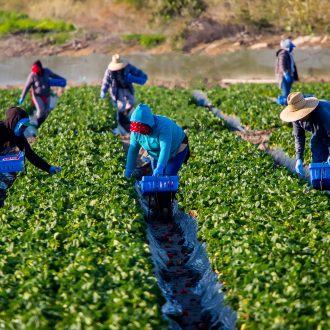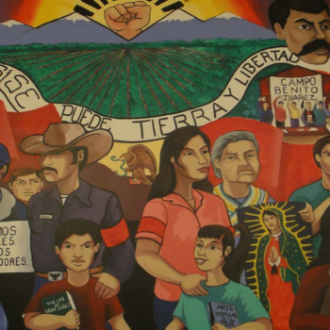
Giev Kashkooli, Vice President of the United Farm Workers, provided testimony at the February 26th hearing of the House Judiciary Committee’s Subcommittee on Immigration and Border Security on the topic of Agricultural Labor and the H2A program.
The National Farm Worker Ministry applauds his testimony in which he called for a path to citizenship for current farm workers and their families. Kashkooli stated that, “To the extent a new path is needed to bring professional farm workers from abroad to this country, they should be accorded equality, job mobility, strong labor and wage protections, and an opportunity to earn immigration status leading to citizenship.”
Download Kashkooli’s full testimony (pdf.) or read it below
Statement of Giev Kashkooli 3rd Vice President of United Farm Workers of America Before the House Judiciary Committee’s Subcommittee on Immigration and Border Security
February 26, 2013
“Agricultural Labor: From H-2A to a Workable Agricultural Guestworker Program”.
Chairman Gowdy, Ranking Member Lofgren, and members of the subcommittee, thank you for the opportunity to testify today. My name is Giev Kashkooli. I am a Vice- President of the United Farm Workers of America. The UFW is the nation’s first successful and largest farm workers union. We are honored to speak with you today and to share alongside the American Farm Bureau and USA Farmers some of the issues that confront American agriculture.
America’s farms and ranches produce an incredible bounty that is the envy of the world. The farmers and farm workers that make up our nation’s agricultural industry are truly heroic in their willingness to work hard and take on risk as they plant and harvest the food all of us eat every day.
But our broken immigration system threatens our nation’s food supply. Thankfully, many of you on this sub-committee are very committed to fixing our broken immigration system. And while our views have diverged in the past from those of Judicial Chairman Goodlatte, we do not question his commitment to improving our immigration system for agriculture and we are grateful for the seriousness which he has studied these issues. The UFW and our nation’s agricultural employers have also often been at odds on many policy issues – but we have been working diligently to see if we can come to an agreement that would unify our nation’s agriculture industry and we believe we are making progress toward that end. We are in a unique moment in our nation’s history – and together with a lot of work you on this committee can make the changes we need to secure our nation’s food supply.
Let me speak a little about what is at stake for the women, men, and their children who work in the fields and do some of what Congressman Goodlatte recently called the “hardest, toughest, dirtiest jobs.” Every day, across America, about two million women, men, and children labor on our nation’s farms and ranches, producing our fruits and vegetables and caring for our livestock. At least 600,000 of these Americans are US Citizens or permanent legal residents. Our migrant and seasonal farmworkers are rarely recognized for bringing this rich bounty to supermarkets and our dinner tables. And most Americans cannot comprehend the difficult struggles of these new Americans who work as farmworkers and their family members. Increasingly, however, America’s consumers are asking government and the food industry for assurances that their food is safe, healthy and produced under fair conditions.
The life of a farm worker in 2013 is not an easy one. Most farm workers earn very low wages. Housing in farmworker communities is often poor and overcrowded. Federal and state laws exclude farmworkers from many labor protections other workers enjoy, such as the right to join a union without being fired for it, overtime pay, many of the OSHA safety standards, and even workers’ compensation in some states. Farm worker exclusion from these basic Federal Laws in the 1930s is one of the sadder chapters of our history.
In California, where state laws thankfully provide most of these protections, we have still seen dozens of farm workers die over the last several years for the simple lack of water and shade.
Such poor conditions and discriminatory laws have resulted in substantial employee turnover in agriculture.
Immigration policy reform can play a role in achieving the aims of numerous federal commissions that have addressed the labor needs of agriculture. Let me highlight one of these reports for you today. President Ronald Reagan and Congress created the Commission on Agricultural Workers. The Commission had 4 members appointed by President Reagan; 4 by the Senate President Pro Tempore at the time – Senator Strom Thurmond — and 3 by the Speaker of the House. Their report – the “Report of the Commission on Agricultural Workers” in 1992 made recommendations for the “development of a more structured and stable domestic agricultural labor market” that would “address the needs of seasonal farmworkers through higher earnings, and the needs of agricultural employers through increased productivity and decreased uncertainty over labor supply.”1 One such recommendation was that “[f]armworkers should be afforded the right to organize and bargain collectively . . .” We believe, as the mostly Republican authors of the report suggested, that improving wages and working conditions and increasing farmworkers’ legal protections would help attract and retain current workers in the farm labor force and end chronic employee turnover.
We also want to have serious discussions about the future of the work force upon which American agriculture and American consumers depend. First and foremost, we seek an end to the status quo of poverty and abuse; we should not continue to treat farm workers as second-class workers. Our number one priority is reform of our immigration process that includes a workable legalization program for the one million or more farm workers who are currently working in the fields and their immediate family members with a roadmap first to permanent resident status, and then to citizenship. We believe that farm workers who harvest our food and feed us deserve at the very least the right to apply for permanent legal status.
To the extent a new path is needed to bring professional farm workers from abroad to this country, these workers should be accorded equality, job mobility, strong labor and wage protections, and an opportunity to earn immigration status leading to citizenship. We have seen Europe’s failed experiment of second class legal status. We believe that
1Report of the Commission on Agricultural Workers, Executive Summary, p. xxiv, Washington D.C. November, 1992.
America is exceptional. Our agricultural system is just one more example of how America is exceptional, so we should honor the new Americans who continue to build our agricultural system as the heroes that they are for our country.
There are agricultural employers who will continue to need to have the security of a contract with farm workers in order to make sure they have the correct number of professional farm workers for the right period of time to do the work by the unpredictable schedule of a harvest. The H-2A program needs to serve the needs of both agricultural employers risking capital and their livelihoods and of agricultural workers who risk their lives and sacrifice their bodies. The H-2A program’s labor protections evolved over decades in response to the harms posed by the Bracero program and the former H-2 program. The H-2A program’s protections were primarily written by the Reagan Administration. The Department of Labor has been approving over 90% of employers’ applications and we support efforts to make the system more efficient. But we’re hopeful that we can all agree that any complaints about bureaucracy do not justify reducing the wages and job opportunities of US workers; or eliminating wage, housing, and transportation protections for professional foreign workers who we have invited to harvest our food.
We ask this subcommittee to support a new, comprehensive immigration process that grants current farmworkers and their family members a reasonable and prompt opportunity to earn legal immigration status and citizenship, and ensures that future workers are brought here in a manner that elevates farm work. By having such a system, we can ensure that we continue to have an agricultural industry that is the envy of the world – and honor all of the women and men who have built such an exceptional domestic food supply.




